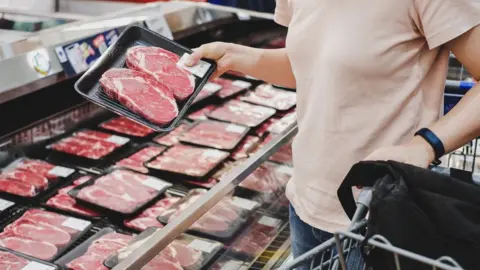By Paul SeddonPolitical Correspondent

 Good pictures
Good picturesThe UK has suspended its trade talks with Canada after nearly two years on a post-Brexit deal following a dispute over beef and cheese.
Trade between the two countries currently takes place under the terms of the agreement Britain has rolled out since its membership of the European Union.
A temporary agreement allowed the UK to sell cars and cheese without high import duties.
But talks on extending these as part of a new deal have now broken down.
It means the UK's terms of trade with Canada will now be worse than if they were part of the EU's deal with the country.
It is the first time the UK has formally suspended negotiations with a trading partner since it formally left the EU trading regime in 2021.
British car companies now face the possibility of higher tariffs – import duties – to sell into the Canadian market from the start of April.
Higher Canadian tariffs of up to 245% on British cheese already kicked in earlier this month, after previous regulations expire at the end of 2023.
Talks are underway to reach a bespoke agreement between the two countries from March 2022.
Canada's government faced political pressure from domestic cheese producers.
It is pushing for the UK to ease its ban on hormone-treated beef, which producers say will effectively shut them out of the British market.
A UK government spokesman said it reserves the right to “suspend negotiations if no progress is made with any country”.
“We have always said that we will only negotiate trade deals that deliver for the British people,” they added.
“We are open to re-opening negotiations with Canada to build a strong trade relationship in the future”.
A UK government source said: “If Canada comes back to the table with a serious offer and willingness to make progress, we're all ears.”
A spokeswoman for Canada's Trade Minister Mary Eng said she was “disappointed” at the stalling of talks and had conveyed this to UK Business Secretary Chemie Patenoch.
“Their decision to continue to maintain market access barriers to our agricultural industry and unwillingness to reach a mutual agreement has stalled negotiations,” the spokesperson added.
“The UK is a long-standing trading partner and I am confident that we will be able to negotiate a deal that will be successful for both Canada and the UK”.
“But let me be clear – not good for Canadians – not good for our Canadian businesses, farmers and workers.”
Total merchandise trade between the two countries was £19.2bn in 2020. According to the UK GovtUK imports from Canada worth £7.3bn and UK exports to Canada worth £11.8bn.
Minette Batters, president of the National Farmers' Union of England and Wales, said the decision was a “relief for farmers”.
“I'm glad the government is sticking to its line and not giving way,” he told BBC Radio 4's Today programme.
“We have already damaged our economy and agricultural sector by completely liberalizing trade deals with Australia and New Zealand. We had to take a strong stand on this.”
The Canadian Cattlemen's Association said it supported its government's “tough approach” to beef rules, and that the UK “has shown no sign that it is ready to fully embrace Canada's food safety system, which is widely recognized around the world”.
